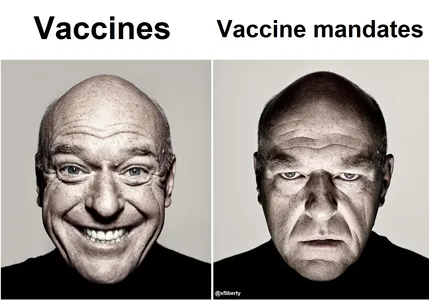Dear Hiveans,
I just found Japan's Ministry of Health guidelines on vaccination here: https://www.mhlw.go.jp/stf/covid-19/vaccine.html
"Although we encourage all citizens to receive the COVID-19 vaccination, it is not compulsory or mandatory. Vaccination will be given only with the consent of the person to be vaccinated after the information provided. Please get vaccinated of your own decision, understanding both the effectiveness in preventing infectious diseases and the risk of side effects. No vaccination will be given without consent. Please do not force anyone in your workplace or those who around you to be vaccinated, and do not discriminate against those who have not been vaccinated."
Japan sets a great example of how to deal with a virus, vaccines and with society.

In my opinion all depends on the people's trust in the government:
- If there is trust in the government and its institutions, there is no need for a vaccine mandate (because people trust and get vaccinated).
- If there is no (or little) trust in the government and its institutions, a mandate is a no-go because of its high risk (as the likelihood for uprisings increases significantly).
I think that, over the last decade, governments around the world (especially in Europe and the US) have gambled away the trust people placed in them, and these governments have become so estranged from a substantial part of the population, that now an increasing number of people refuse to act on governments' recommendations and mandates. And if the reaction of government is to increase coercion, I worry about a spiral of violence.
Have a great Friday,
zuerich
Liebe Hiver,
ich bin gerade über die Impf-Richtlinien des japanischen Gesundheitsministeriums gestolpert: https://www.mhlw.go.jp/stf/covid-19/vaccine.html
Obwohl wir alle Bürger ermutigen, sich gegen COVID-19 impfen zu lassen, ist die Impfung nicht obligatorisch oder vorgeschrieben. Die Impfung wird nur mit dem Einverständnis der zu impfenden Person nach erfolgter Aufklärung durchgeführt. Bitte lassen Sie sich aus eigener Entscheidung impfen, wobei Sie sich sowohl über die Wirksamkeit bei der Verhütung von Infektionskrankheiten als auch über das Risiko von Nebenwirkungen im Klaren sein sollten. Ohne Zustimmung wird keine Impfung durchgeführt. Bitte zwingen Sie niemanden an Ihrem Arbeitsplatz oder in Ihrem Umfeld, sich impfen zu lassen, und diskriminieren Sie niemanden, der nicht geimpft wurde.
Japan ist ein gutes Beispiel dafür, wie man mit einem Virus, mit Impfungen und mit der Bevölkerung umgehen kann.

Meiner Meinung nach hängt alles vom Vertrauen der Menschen in die Regierung ab:
- Wenn das Vertrauen in die Regierung und ihre Institutionen hoch ist, braucht man keine Impfpflicht (weil die Menschen Vertrauen haben und sich impfen lassen).
- Wenn das Vertrauen in die Regierung und ihre Institutionen nicht (oder kaum) vorhanden ist, ist eine Impfpflicht aufgrund des hohen Risikos ein Nogo (da die Wahrscheinlichkeit von Aufständen erheblich steigt).
Ich denke, dass die Regierungen in der ganzen Welt (vor allem in Europa und den USA) in den letzten 10 Jahren das Vertrauen, das die Menschen in sie gesetzt haben, verspielt haben, und dass sich diese Regierungen von einem großen Teil der Bevölkerung so sehr entfremdet haben, dass sich nun immer mehr Menschen weigern, den Empfehlungen der Regierungen Folge zu leisten. Und wenn die Reaktion der Regierungen darin besteht, den Zwang zu erhöhen, befürchte ich eine Gewaltspirale.
Ich wünsche Euch einen schönen Freitag,
zuerich
Queridos Hiveanos,
Acabo de encontrar las directrices del Ministerio de Salud de Japón sobre la vacunación aquí: https://www.mhlw.go.jp/stf/covid-19/vaccine.html
"Aunque animamos a todos los ciudadanos a que reciban la vacuna COVID-19, no es obligatoria ni forzosa. La vacunación se realizará sólo con el consentimiento de la persona que se va a vacunar tras la información proporcionada. Le rogamos que se vacune por decisión propia, comprendiendo tanto la eficacia en la prevención de enfermedades infecciosas como el riesgo de efectos secundarios. No se administrará ninguna vacuna sin el consentimiento. Por favor, no obligue a nadie en su lugar de trabajo o a los que le rodean a vacunarse, y no discrimine a los que no se han vacunado".
Japón es un gran ejemplo de cómo enfrentarse a un virus, a las vacunas y a la sociedad.

En mi opinión todo depende de la confianza de la gente en el gobierno:
- Si hay confianza en el gobierno y sus instituciones, no es necesario un mandato de vacunación (porque la gente confía y se vacuna).
- Si no hay (o hay poca) confianza en el gobierno y sus instituciones, un mandato es un no-go debido a su alto riesgo (ya que la probabilidad de levantamientos aumenta significativamente).
Creo que, en la última década, los gobiernos de todo el mundo (sobre todo en Europa y Estados Unidos) se han jugado la confianza que la gente depositaba en ellos, y estos gobiernos se han distanciado tanto de una parte sustancial de la población, que ahora un número cada vez mayor de personas se niega a seguir las recomendaciones y los mandatos de los gobiernos. Y si la reacción del gobierno es aumentar la coacción, me preocupa una espiral de violencia.
Que tengan un buen viernes,
zuerich
